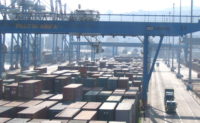
European bidders for two new privately-owned megaports in Israel have dropped out of the competition—two at the last minute—amid growing concerns about pressure on companies to boycott business activity there.
The pro-Palestinian Boycott Divestment and Sanctions movement has been stepping up efforts in recent months to keep firms from doing Israeli business.
The state-owned Israel Ports Development and Assets Co. has received three bids for the tenders to build the Haifa Bayport and Ashdod Southport, each valued at more than $1 billion.
The projects, to be owned and operated by the bidding teams, are part of the government’s strategy to break the monopoly of the two existing state-owned Mediterranean ports at Haifa and Ashdod and increase competition in the economy.
The two groups that dropped out after the prequalifying stage within the last two months were Holland port developer Royal Boskalis Westminister and Italy’s Condote de Agua.
Three other companies dropped out earlier in the process: Spanish companies Fomento de Construcciones y Contratas (FCC) and Cyes, and Germany’s Mobius Bau.
The ports company would not confirm the firms' withdrawal because of political issues, telling Ha'aretz, an Israeli publication, that the Dutch firm did not pass the first prequaiification stage. The other firms based their decisions on financial issues or issues with partners, according to the publication.
The three groups in competition are: a consortium of Israel’s Shapir Civil and Marine Engineering Ltd. and Ashtrom Group; China Harbour Engineering Co., a subsidiary of the majority state-owned contracting giant China Communications Construction Co., with Israeli firm Maman Cargo Terminals and Handling; and Luxembourg-based Ludreco, a subsidiary of Belgium’s Jan De Nul.
According to government sources, the Belgian firm agreed to submit a bid only after being allowed to do so through the Luxembourg unit. It now is teamed with Israel's Shikun u’Binui Holdings Ltd. through its Solel Boneh subsidiary, after its previous partner FCC dropped out, according to Ha'aretz.
The final technical bids are due in May for the ports, with the final award expected to be made this summer. “Work is slated to begin by the end of the year and take five to six years to complete,” says an official of the Israel Ports company.
The initial tender was issued in July and calls for the terminals to be built on reclaimed land. Each will have two quays with a total length of 1,600 meters with maximum waterside depth of 17.3 meters in order to handle the new generation of triple E container ships.
Israeli Finance Minister Yair Lapid has warned recently about the impact of a boycott on the country’s economy, noting that the collapse of US brokered peace talks with the Palestinians could be devastating.



Post a comment to this article
Report Abusive Comment